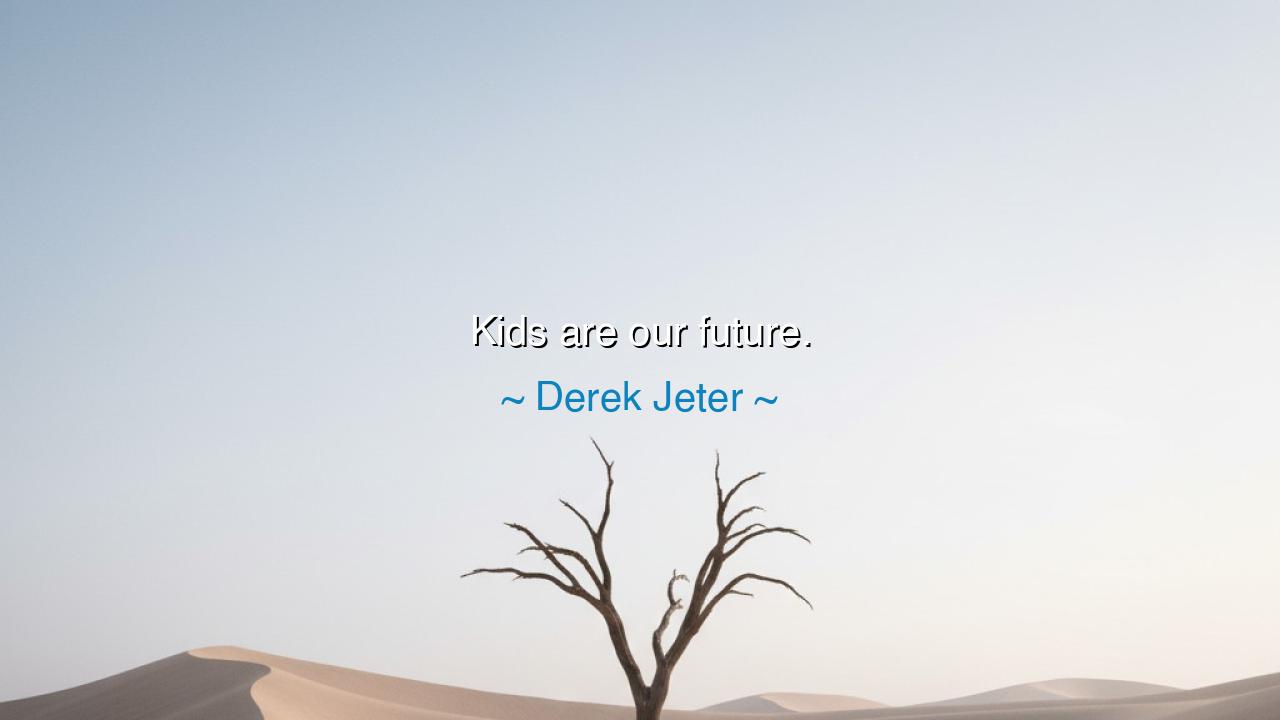
Kids are our future.






The words “Kids are our future”, spoken by Derek Jeter, seem simple—almost too brief to contain the weight of generations. Yet, within their simplicity lies a truth as ancient as humanity itself. From the dawn of civilization, elders have looked into the eyes of the young and seen there not just innocence, but destiny. Children are not merely those who come after us—they are the living continuation of what we have built, the carriers of our dreams, our values, and our failures. To see a child is to glimpse the world yet to come, the reflection of what we nurture today. Thus, Jeter’s words are not a statement—they are a summons to responsibility.
In the wisdom of old, it was said that a society is judged not by its riches nor by its armies, but by how it tends to its youth. The ancients knew that to neglect the young is to doom the future, for no tree bears fruit if its roots are starved. When Jeter, a man of discipline and grace upon the field, spoke these words, he was not speaking as an athlete alone but as a guardian of legacy. He understood that greatness is not measured only in victories, but in what we pass on. His quote is a call to those who lead—to teach, to protect, and to build foundations strong enough for those who follow.
Consider the tale of Nelson Mandela, who once said, “There can be no keener revelation of a society’s soul than the way in which it treats its children.” In the land of his birth, children once suffered under the weight of segregation and despair. Yet Mandela, like Jeter, believed that hope lies in the young. Through education, through faith, through the courage to dream beyond circumstance, those very children became doctors, teachers, and leaders—the architects of a freer nation. His belief in them was an act of defiance against hopelessness. It was proof that to invest in the young is to forge the future itself.
Children are the mirrors of our choices. What we show them becomes what they show the world. If we teach them anger, they will know only division; if we teach them wonder, they will discover stars. When we say “Kids are our future,” we proclaim that every lesson, every kindness, every opportunity we offer a child is an offering to tomorrow. The laughter of a child, the curiosity in their eyes—these are the seeds of eternity. For what greater legacy can one leave than a generation better, wiser, and braver than one’s own?
In the spirit of the ancients, let us see this truth as sacred: the young are not ours to command, but ours to guide. They are not clay to be molded, but flames to be kindled. Each carries within them the spark of the divine, a promise that life renews itself endlessly. To believe in children is to believe that creation has not finished its work—that through them, the universe continues to unfold in beauty and purpose.
O seekers of wisdom, take heed: do not grow weary in teaching, in loving, in protecting the young. For though the path is long, your care will echo across time. Be mentors, not masters. Listen more than you speak. Encourage the questions that unsettle you, for in those questions lies the evolution of humanity. Remember always: to build schools is to build civilizations; to inspire a child is to shape destiny.
And when doubt darkens your heart, remember Jeter’s quiet truth: “Kids are our future.” Say it not as a slogan, but as a vow. Let it remind you that every act of kindness toward the young is an act of faith in humanity itself. Teach them honor, courage, humility, and love. Tell them stories of heroes—not of those who conquered others, but of those who conquered themselves. Then, when your days are done, you may rest knowing that the torch you carried still burns bright, passed from your hands to theirs, lighting the path toward a brighter, nobler world.






AAdministratorAdministrator
Welcome, honored guests. Please leave a comment, we will respond soon